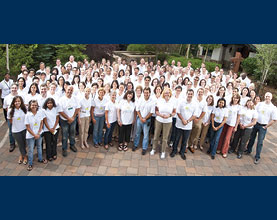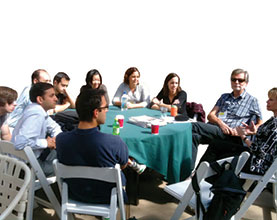Sep 12, 2011
From July 30 through August 5, 2011, 100 trainee researchers and nearly 40 clinical research experts gathered in Vail, Colorado, for the ASCO/American Association of Cancer Research (AACR) Workshop: Methods in Clinical Cancer Research. A combination of didactic presentations, career-development mentoring, and intensive protocol development served to train the next generation of dedicated clinical researchers in oncology.
The annual workshop’s primary goal is to educate early-career investigators (including 75 clinical fellows and 25 junior faculty) in the principles of excellent clinical trial design. Faculty illuminate the perils and pitfalls of poor design that can delay a trial or even render it completely ineffective, wasting time and resources. ASCO and AACR created the course in the hopes of increasing the reliability and effectiveness of clinical trials by:
- giving trainees the tools they need to conduct clinical trials that will yield clear results that investigators can use to proceed to the next level of research or that lead to a change in clinical practice;
- exposing early-career clinical scientists to the full spectrum of challenges in clinical research—including surgery, radiotherapy, conventional and investigational antineoplastic agents, multidisciplinary treatment regimens, immune therapy, biologic therapy, and multimodality and combination treatments; and
- developing a cadre of well-trained clinical researchers whose expertise will foster better clinical trial design and thereby hasten the introduction of improved therapies for cancer treatment and prevention into everyday practice and patient care.
Clinical fellows and junior faculty from any oncology discipline are encouraged to attend. Along with a CV, essay, and letter of recommendation, applicants must submit an idea for a clinical trial protocol that can be developed over the course of the workshop. Attendees are selected largely on the merit of their proposed protocol. Care is taken to create a diverse group of participants from all specialties and disciplines and to include populations traditionally underrepresented in oncology and biomedical research.
The acceptance rate speaks to the popularity and competitiveness of the workshop: fewer than half the applicants are accepted each year. All attendees receive financial assistance to offset the costs of attendance thanks to generous support from the National Cancer Institute and corporate donors—fellows receive full scholarships and junior faculty receive stipends.
The program is composed of five session types, along with group meals and social activities:
- Protocol development sessions, the main focus of the workshop, in which each participant develops a concept sheet as the foundation for their clinical trial protocol and—through extensive mentoring—designs and completes the writing of the protocol before the end of the workshop
- Lectures and panel discussions on specific topics presented by recognized experts in the field, which give participants an essential overview of the field, the principles of design, and the conduct of high-quality clinical trials
- Small-group discussion sessions on special topics (such as laboratory correlates, imaging endpoints in clinical trials, and measuring immunologic outcomes) that are either essential to the success of many different kinds of clinical trials or offer an opportunity for in-depth discussion on topics of special interest to clinical investigators
- “Office hours,” one-on-one appointments for individual counseling and advice on protocol and career development
- Special-interest sessions for mentoring and career advice for individuals in the fields of surgical/gynecologic oncology, pediatric oncology, medical oncology, and radiation oncology
The workshop has been held in Vail since soon after its inception (it first took place in Salt Lake City), to the point where it is now commonly called “the Vail course.” The beautiful setting, with a range of summer recreational activities such as hiking, golfing, fishing, and horseback riding, is also ideal in its relative seclusion—the course venue is two and a half hours from the nearest airport. When an attendee or faculty member commits to participating, they are in for the entire week.
Endgame: A complete protocol
Protocol development sessions constitute the core activity of the workshop and allow students to apply the lessons learned in the didactic sessions to their own clinical trial ideas and receive detailed critiques of their protocols from experienced scientists. Participants leave the workshop with not only an impressive store of knowledge, but also with a completed protocol ready to be submitted to their Institutional Review Board (IRB) for approval.
“The most successful part of the course is always the protocol development sessions,” said workshop Co-Chair Mary L. (Nora) Disis, MD, of the University of Seattle. “This is where students get one-on-one time with faculty. It’s a very powerful, very intensive learning experience.”
These small-group sessions are composed of eight trainees and facilitated by three to four faculty members: two clinicians, a statistician, and in some cases a patient advocate. In addition to the full schedule of sessions, attendees have daily assignments related to the development of their protocols, such as synopsis sheets, drafts of statistical and informed consent sections, and the creation of a final completed protocol. These assignments are due each evening; faculty leaders then read and provide feedback on their trainees’ submissions by the next morning.
 |
| 2011 “Vail Course” students and faculty.—COURTESY OF ASCO/AACR WORKSHOP |
Without the dedication of the faculty to protocol development feedback, the course would not be possible, believes workshop Co-Chair Lee M. Ellis, MD, of the University of Texas M. D. Anderson Cancer Center. “When you get back from dinner, you have eight protocols in your inbox that you have to review and edit before the next morning. The continued commitment of the faculty to work day and night to help these trainees learn how to write a clinical trial that is going to make a difference is magnificent and inspiring,” he said. “Every faculty member, including past ASCO presidents, reviewed all the protocols in their group every night and returned them the next morning just to start the whole process again the next night. Nobody on the faculty takes an out.”
“Rubbing shoulders with faculty of the caliber present at Vail is truly motivating for junior faculty like me. I certainly feel that I came out of the conference not only as a better investigator, but as a better doctor in general,” said 2011 attendee Muhammad Shaalan Beg, MD, of UT Southwestern Medical Center.
The value of the one-on-one attention is apparent in what Co-Chair Mithat Gönen, PhD, of Memorial Sloan-Kettering Cancer Center, calls the “eureka moments” that he witnessed: “One trainee in my group had trouble grasping a principle of dose escalation trials. Although he didn’t directly tell me he didn’t understand, he kept asking the same question using different words, and I could see that I wasn’t getting the point through. He signed up for my office hours and brought up the question again. I ended up drawing a schema on a piece of paper that we discussed for about 10 minutes, and his face lit up. That was such a great moment—the moment he understood a principle that will stick with him for the rest of his life.”
A focus on statistics, patient advocacy
 |
| Participants take advantage of the small-group atmosphere.—COURTESY OF LEE M. ELLIS, MD |
A critical aspect of protocol development is statistics. Each protocol development group includes a statistician faculty member, as does the workshop leadership. Dr. Gönen served as the statistics expert among the 2011 Chairs.
“Clinicians who are involved in protocol development are very passionate about the disease they are treating and the treatment they are using, which is a great thing. The statistician’s unique position in the development of a trial is to bring a dispassionate, unbiased view to the table,” he said.
He noted that there is a great need for statisticians working on oncology clinical trials, as a gap exists between statistics training and careers in protocol development. To address that gap, a junior statistician was selected as a trainee for this year’s course as part of a pilot program, now in evaluation.
Patient advocates also play an important role on the course faculty, keeping a focus on the human element of clinical trial design. “By talking to the patient advocates, trainees see that they are teaming with the patients to conduct an experiment to answer a question. I see the trainees’ ideas about clinical research maturing over the course, especially in their understanding of what they’re asking our patients to participate in,” Dr. Disis said.
Investing in the next generation
While attendees focus on protocol development, the value of the course to its faculty and leadership is in developing a new cadre of oncology clinical researchers who will go on to become leaders in their own right.
“Huge credit goes to the visionaries of this course who saw the exponential payback to committing yourself for a week to 100 trainees, because those trainees go out and become teachers themselves. The faculty here make a big investment in the trainees because we want them to outdo what we ourselves have done,” Dr. Ellis said.
According to data collected from program evaluations, course graduates continue in their productivity even after the program concludes. Three years after the workshop, at least two-thirds of the attendees were spending substantial time in patient-oriented or translational research and had designed or participated in designing three or more protocols that were approved by an IRB and implemented.
The sense of accomplishment that attendees feel from completing their protocols “puts a fire in people’s bellies,” Dr. Disis said. “They want to dedicate their life’s work to clinical cancer research. As someone who’s been in the field for a while, their enthusiasm energizes you and makes you see your own work in a fresh light.”
Dr. Disis is a Professor at the University of Washington, where she specializes in breast and ovarian cancers and immunotherapy. She is an Associate Editor of the Journal of Clinical Oncology.
Dr. Ellis is a Professor of Surgical Oncology and Cancer Biology and The William C. Liedtke, Jr., Chair in Cancer Research at the University of Texas M. D. Anderson Cancer Center. He serves on the Tumor Biology track of ASCO’s Cancer Education Committee and is Chair-Elect of the Cancer Research Committee.
Dr. Gönen is an Associate Attending Biostatistician at Memorial Sloan-Kettering Cancer Center. His professional interests include the surgical treatment of gastrointestinal and hepatobiliary cancers and the development of positron emission tomography in cancer diagnosis and prognosis.
—By Virginia Anderson, Senior Writer/Editor
